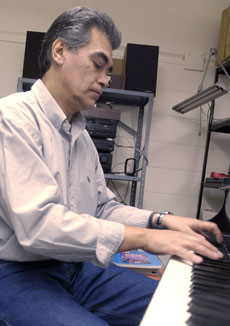Director brings energy to UI opera

Online Poster
December 10, 2004
Maestro Eduardo Diazmunoz always had the heart of a conductor. Beginning at age 13, he would listen to Beatles songs and be able to play them by ear on various instruments without any formal training except for piano lessons. He would then assign instruments to his friends and cousins and form a band by teaching them how to play their part of the song, he said.
Despite the touches of gray in his hair, Diazmunoz’s energy and enthusiasm for music have not waned since his teenage years. This excitement is one of many attributes he brings to the University’s School of Music. Now, he is the new director of Opera Studies and musical director of the New Music Ensemble.
Thomas Schleis, University opera general manager and principal coach, works closely with Diazmunoz.
“He brings a tremendous amount of energy and a musical leadership that (the department) didn’t have before,” Schleis said. “He is a very strong presence.”
Although symphonic conducting is his forte, Karl Kramer, director of the School of Music, asked Diazmunoz to come to the University’s opera department to put the opera program back on its feet and also take care of the New Music Ensemble, Diazmunoz said. He also has a great deal of professional experience and a deep love for the opera, as well as all forms of musical theater, he said.
Get The Daily Illini in your inbox!
The path from The Beatles to classical music was long and interesting, Diazmunoz said. The Mexico native began his training at the National Conservatory in Mexico City. Diazmunoz worked hard to continue his studies in the United States and France.
“When you love something, you don’t rest,” Diazmunoz said. “Work just incites more work.”
Diazmunoz’s career at the University began last year, when he served as a guest conductor in the department after working with schools and orchestras around the world as a guest conductor and instructor.
Now, as director of Opera Studies, Diazmunoz works to bring new titles and productions to the University community that have never been presented. He said he tries to select productions that will engage audience members.
“Many people think of opera as an art form that is sort of boring,” he said. “I think if we try, a good amount of young people will find it is worthwhile.”
The opera department puts on three productions each academic year – one in November, February and April. Their next production is Leonard Bernstein’s Candide, schedule for Feb. 24 until Feb. 26. Diazmunoz studied with the opera’s composer and is excited to introduce it to the University community.
“It is the perfect crossover,” he said. “It is not completely an opera and not completely a musical.”
Diazmunoz has many new ideas for the opera program. For the 2005-2006 season, he hopes to bring a Spanish-language opera to the University for the first time. He also would like to use the New Music Ensemble as the orchestra in the opera department’s spring production.
Schleis thinks it is terrific that Diazmunoz strives to bring new ideas to the program.
“It is the beginnings of a significant opera program here at the University,” he said. “Now, having a permanent musical director, more students will be drawn here.”
Diazmunoz also organizes auditions for each performance and assigns roles. He oversees every aspect of the production, from stage direction to scenery and lighting. As a result, Diazmunoz said he works a great deal with students.
He said the rehearsal schedule is heavy, with six hours of practice on Monday and three hours on Tuesday, Wednesday, Thursday and Friday. He said the students are a key component in why he chose to come to the University.
“All of the students are so talented,” he said. “They are very hard-working people, very engaging and very committed, which is what you need in this profession.”
Diazmunoz encourages students to adopt his strong dedication to performance.
“I do (each performance) as if it’s the last performance of my life,” he said.
Therefore, he said, he is very demanding of his students. He pushes each student to discover his or her capabilities.
“We are all like endless fountains of possibilities,” he said. ” I try to get the best out of every student, even if they have a very small role.”
Diazmunoz’s dedication to engage the audience in every performance spreads to his students.
Juliane Gorretta, a third-year graduate student in fine arts, said Diazmunoz is one of her favorite people.
“He is so exciting to work with, and it is just a positive experience every time I walk in the door to rehearsal,” Gorretta said. “He is someone that has such a joy of making music, and it makes us want to make better music.”
While Diazmunoz loves teaching students, he still maintains conducting engagements around the world. Next year will be Diazmunoz’s 30th year conducting, a milestone he will celebrate in six countries.
“Time plays a lot of tricks on you,” he said. “I still feel young and full of energy. I still feel like I’m 25.”






